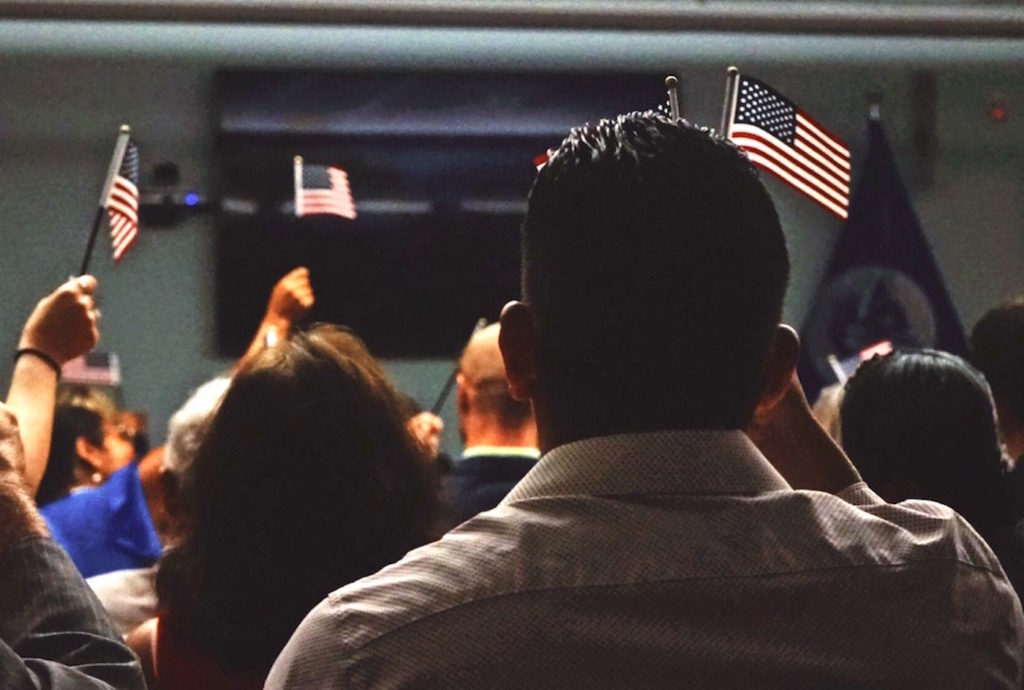She walked by with freshly colored silvery lavender hair and a Michael Kors bag; I almost didn’t recognize her. A refugee of a few years, she’d already shed the fresh-off-an-Iraqi-village look. This is a common evolution. After moving to the United states, other creative women sport Kim Kardashian styles and call it assimilation—freedom and Amreeka and all that.
Please don’t misunderstand me—these are observations of my fellow immigrants, not insults. I’ve been thinking about these women while reading Reihan Salam’s book, Melting Pot or Civil War? A Son of Immigrants Makes the Case Against Open Borders. What follows is my rumination as an immigrant, which, I think, creates a fundamental difference between me and Reihan (a new acquaintance), who was born in America to Bangladeshi parents.
Reihan has a wonderful mind for policy. His ideas—some of which I share, and some of which I do not—are well argued. His suggestions include implementing a skills-based immigration system; outsourcing or automating low-skill jobs; virtual immigration (working in one country while living in another); supporting amnesty (I prefer the word “regularization”) for long-time well-integrated undocumented persons; building up less-developed countries in order to stem migration; developing a points system for the entire immigration system in order to net those that would have the best chance at integrating well into our country; and cutting low-skill immigrants because they tend to stay in generational poverty cycles, and instead investing in the younger generation of poor immigrants, which will provide the younger generation with many opportunities, including a chance to enter the middle class. My colleague Henry Olsen noted in his review of the book that Salam’s ideas “[lead] to a Trumpian policy from distinctly non-Trumpian grounds.”
I think on the immigration policy side, Reihan is top-notch. It would be good for our country if our lawmakers paid more attention to some of his recommendations. But, in the end, Melting Pot or Civil War? is a policy book. It’s a good one, to be sure. But our immigration crisis needs more than just policy.
Start your day with Public Discourse
Sign up and get our daily essays sent straight to your inbox.Assimilation: Understanding American Cohesion
Reihan’s contributions are vital, but man cannot live by policy alone. Policy is only an instrument that can be used for good or for ill. Our dysfunctional immigration system, as well as our dysfunctional culture, needs more than structures and techniques on how to pull as many people as possible into the middle class and mainstream American culture. Reihan wants to say that these are beneficial outcomes, crucial for the integration of immigrants and necessary for American cohesion. However, I would argue, and have argued, that our current culture is in such a corrupted state that in order for immigrants of traditional cultures to integrate into it they would have to corrupt themselves. As long as Americans themselves struggle with their national identity, they don’t really have anything substantial and beautiful to invite the immigrant to integrate into. The one thing the American mainstream does offer is materialism and consumerism. I have certainly seen assimilation to that, but it is superficial and destructive.
One of the key features of Reihan’s method of assimilation is to stop replenishing the immigrant communities. Then, just like the Irish and Italian immigrants of yesteryear, these new immigrants will eventually marry native-born Americans and be assimilated into America. I did that, in spite of the fact that my immigrant community—the Iraqi Christian subculture—has grown (mostly due to violence and persecution in our homeland). My eager attempts to leave behind my Iraqi heritage and fully embrace the American mainstream had grave consequences on my life. Only through my Catholic faith have I come through those difficulties. Like an escapee, I go around testifying of the horror.
I’m not saying that every single immigrant who marries a non-immigrant is doomed and will become vulnerable to the baseness of American culture. What I am saying is that the American culture is depraved. It generates two different kinds of assimilation in today’s immigrants: one is superficial, and it takes place when immigrants find jobs, make money, and start living on the outside like other Americans. But, more often than not, the habits and thinking of their heritage do not change, at least not until the first or second generation is born in the United States. The second is the refusal to fully assimilate. Instead, immigrants build sustainable enclaves of various sizes (e.g. Dearborn, Michigan).
Now, one can argue that we are a multicultural country and should not require the immigrants to our land to think as we do or take up our habits. That’s what my mom was told years ago when she went to her naturalization ceremony. Some believe that it is enough that we give immigrants the space to work and prosper. These individuals argue that this is the only level of integration that we should seek.
Two important questions arise: is it true that assimilation and integration have become more difficult today than in yesteryear? If so, what are the stumbling blocks preventing immigrants from fully assimilating, as they used to? Reihan’s answers focus on educational and economic factors. Reihan’s approach is very American; it’s practical and economically focused with some really smart ideas. But there’s more to a flourishing human life than education and money.
Rootedness and the Needs of the Human Soul
Here in Arizona, we see a high rate of suicide in elderly refugees of the Bhutan community. The reasons are what we expect: isolation, loneliness, depression, other mental health complications, and the English barrier. Because I see immigration—of any type—as a fundamental human issue affecting the soul, this tragedy and others like it raise questions that go beyond policy and immigration laws.
As Simone Weil has written, there is an obligation to every human being “for the sole reason that he or she is a human being.” This is so because obligations are eternal and “coextensive with the eternal destiny of human beings.” These obligations are mediated, usually through structures and institutions, but they can never be annihilated or dissolved. And so, as Weil writes: “The fact that a human being possesses an eternal destiny imposes only one obligation: respect.” To this individual obligation, I would add an obligation to respect peoples. Just as many would agree that mankind had an obligation to the Jews during World War II, so too there is an obligation to respect the unique and irreplaceable peoples of the world, not only for their sake, but for the sake of their heritage and for all their children yet to come.
The best way to define the obligation of respect is to identify human needs and work to provide them. For example, the eternal obligation to prevent starvation of a human being is universal and foundational, since food is a basic human need. Besides basic bodily needs like food and shelter, a person has needs for the life of the soul that are analogous to food for the body. Depriving a person of “food necessary to the life of the soul” is a form of cruelty wrote Weil. In her book The Need for Roots, she enumerates these needs: order, liberty (with limits), responsibility, equality, hierarchism, honor, punishment, freedom of opinion, security, risk, private property, collective property, truth, and rootedness. She writes: “To be rooted is perhaps the most important and least recognized need of the human soul.”
Admitting that it’s a difficult concept to define, Weil explains that human beings have roots “by virtue of his real, active and natural participation in the life of a community which preserves in living shape certain particular treasures of the past and certain particular expectations for the future.” I have previously explored rootedness using the language of identity. This is a great need and obligation, and the most underestimated—often derided—in the modern world. There are many reasons for uprootedness, many have to do with the disruptions of and perversions to the needs of the human soul, which I listed above.
Immigration, work migration, the flight of refugees due to war or persecution—all these upheavals are different faces of uprootedness. To be sure, uprootedness can be experienced by those who are geographically stationary as well, but here I am referring to that which happens to the individual person and/or peoples who, for one reason or another, are physically uprooted.
To use Weil’s language, we have or ought to have multiple roots. These are the bonds that tether a person to the different spheres of belonging, and immigration disrupts all these spheres. We see how this happens: there is the physical move from one town to another or one country to another. This involves leaving the variety of social circles in which that individual was embedded, such as family, friends, co-workers, and a religious community. It also means the disruption of the sphere that tied that individual or group to their town, city, or country. As a result, uprootedness can also disrupt the political spheres.
Most immigrants attempt to re-root in their new homes and re-form bonds into spheres that approximate what they left behind. Some do this successfully, and ethnic communities often act as middle social institutions. But it is a complex process, potentially leaving the immigrant—at a deeper level—in a perpetual state of uprootedness, primarily because those things we call “roots” develop while a person is growing up. They shape and act on his soul. He is who he is because of them. Without them, at best, he is a wounded version of himself, at worse, he is never himself again.
Noting the situations described, we need to reflect on the idea of rootedness as we evaluate policy proposals. In other words, we need to recognize what strengthens versus what weakens individuals and societies. For example, Reihan highly favors automation and offshoring so as to cut down on low-skill immigration. Before we say a quick “yes” or “no” to such a thing, and before we look at what it can do financially, we had best study well what it would do to the people most affected by such a policy: the low-skill immigrants and the native-born working class. Given the human soul’s need for roots, we may want to think more creatively and choose the option that would optimize roots, even over money.
We have an obligation to meet the needs of the human soul, needs that go beyond simply pulling people up into the middle class. A satisfied soul comes from a culturally and religiously thick culture; even those who suffer can suffer well in that kind of environment. This requires a fundamental—and cultural—shift not just in how we view immigrants, but especially in how we view ourselves.
We first need to re-awaken our desire to love our country and re-acquaint ourselves with what it means to be an American. Only then can we model that version of an “American” for immigrants. Social despair is rampant, and it is a sickness that cannot be solved politically from the top down. This is the job of intermediary institutions, such as religious organizations and local communities. It is increasingly apparent that we cannot neglect the policy issue. But as we evaluate what policy changes to make, let’s consider the human cost.













